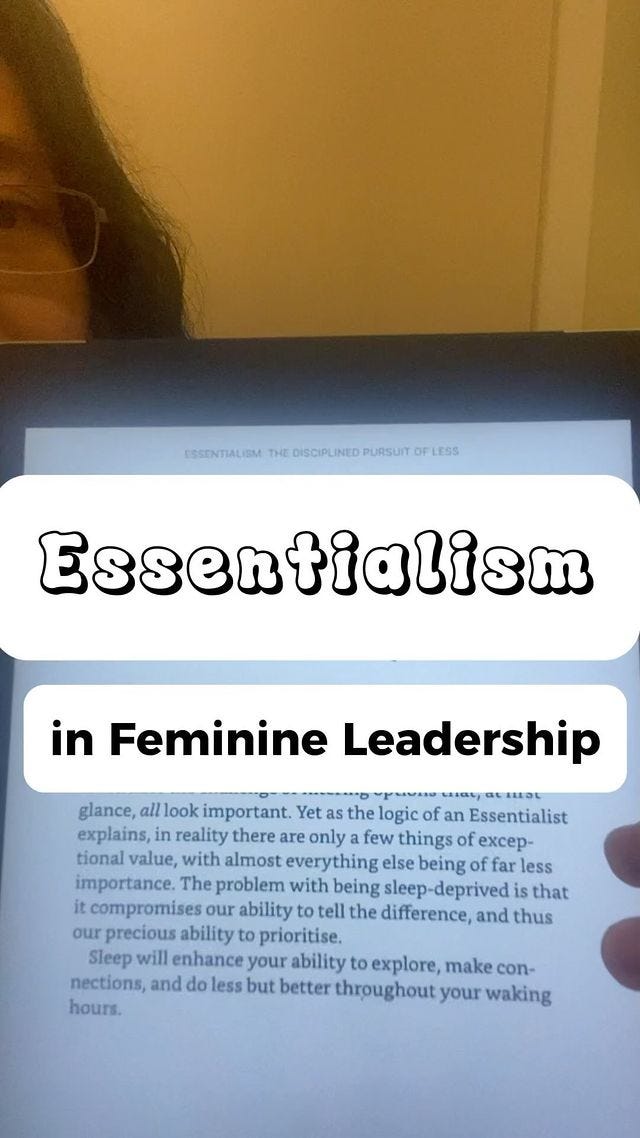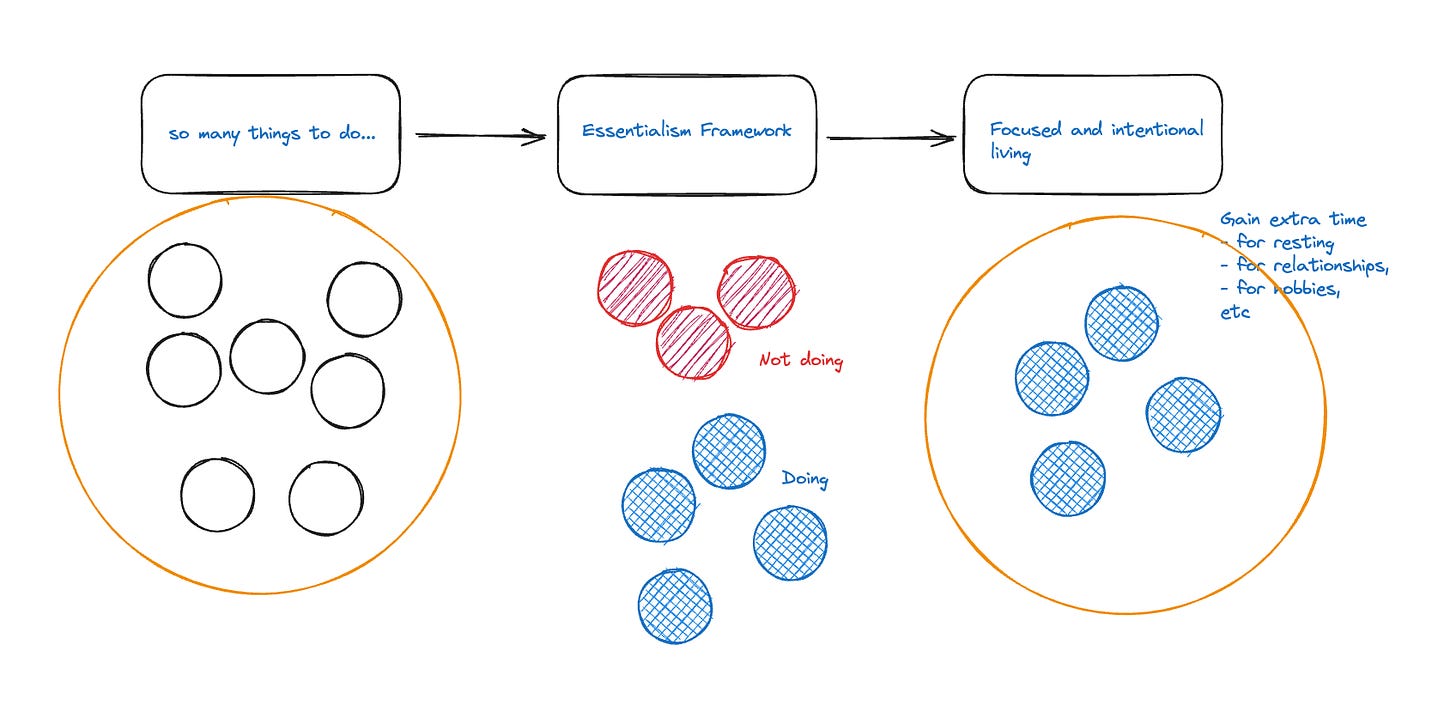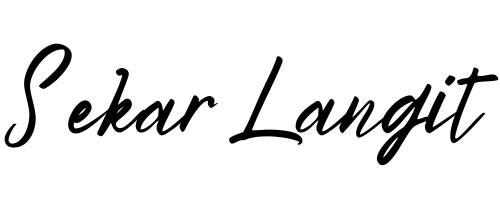Hello lovelies,
I’m reading a book, Essentialism, by Greg McKeown. I spoke about it a little in my Instagram reel below.
Essentialism is such an important topic in my slow living philosophy because it forces you to pause and think about which areas of your life you need to concentrate on and which to cull, so you’ll only dedicate your finite resources to the things that move the needle.
It’s similar to the Pareto chart principle. Focus on the 20% leverage for the 80% of the outcomes.
The chapters start with quotes, and the quotes are intriguing. They made me think about whether my approach to life is sustainable.
Now, think about it. When we’re talking about slow living, many aspects of slow living are not attainable for people working multiple jobs, which has become a reality these days.
Read my Medium post about solopreneurship, to give you an idea.
But when you think about it, what if there’s a way for us to focus on the essential items, on the things that we want to do well, so that our life still contributes to the causes that we care about without compromising the allocated time, energy, and attention for other things that matter, such as our health, wealth, and relationships?
The answer is by being ruthless in your essentialism practice.
The book addresses the modern human tendency to do more, to achieve more, to put up more stuff on our plates. That is, until (usually) health issues prop up sneakily, forcing us to rest for a long time, becoming “non-productive” anyway. I put the quotes around the word because resting is actually a productive activity.
Who can function without rest, without adequate nutrition, sustainable in the long run? Nobody. At one point, your body starts screaming for help. And, please do trust me when I say it’s gonna be an emotional rollercoaster journey to listen to what our bodies need. In the process, it might detract you from fully engaging in your day-to-day busy life. So, relative to the delayed gratification case, start paying more attention to the activities that resonate with downtime, if you haven’t.
The Essentialism book addresses this issue in Chapter 8: Protect the Asset. The asset in question is our bodies.
I simplify the causality relationship of being an essentialist and reaching the slow-living lifestyle that benefits us all.
Applying the learning from the book, and taking notes on my current physical health that is on the road to recovery from amenorrhea (I’ll talk about it in the coming posts, probably), I create a mental framework to decide whether an activity is worth my time and other resources (such as energy, attention, or money).
It’s only three questions, but it’s helpful to strip the noise from the activities that matter.
1/ Does this activity propel me towards the lifestyle I seek?
Mind, this is not just about money-making opportunities. Since this publication is about the holistic view that I constantly nurture, intangible benefits such as maintaining relationships with my loved ones are also primary elements in my life outlook.
Damaged or dry relationships with people who matter to us lead to a domino effect later down the road. It’s like a ripple on the lake, spreading from a drop of a pebble across the surface.
In practice, for example, I prioritise calling my parents a couple of times a week. That’s how I manage a long-distance relationship with them.
This makes my weekends more enjoyable, to be honest. Weekends are mostly for writing and speaking to my parents (and friends, too).
2/ If I don’t do this, what will be the trade-off?
Being a generalist is a virtue in my career of choice: in product management, entrepreneurship, and writing. But even that, the problems needing to be solved in those fields are often specialised issues. It means you’ve got to have a certain level of knowledge, preferably deep enough, to decide on something.
The bottom line is: you can’t just be a generalist 24/7 to succeed.
In essentialism, we’re faced with the classic problems of supply and demand. You have unlimited problems to solve, interests to pursue, or activities to participate. You might want to solve world hunger, for instance, while learning to play classical music and be a world-class footballer.
Well, nobody forbids you from being whatever you want. But the supply is finite. You operate in a 3D world, where space-time is the constraint.
So, what’s the trade-off if you don’t do this?
In my case, there are times I have multiple ideas running rampant in my head, all are like my little brainchildren fighting to be put into articles or business plans at once. If the ideas pertain to connections or networking events, they all want to be connected to certain people right away, bearing no time gap between the idea popping up and the execution. It can’t be done like that, obviously. There are factors outside my control, such as the other person’s availability and the event's financial responsibilities (tickets if any, transport or lodging plans, etc).
So, what should I prioritise? The answers depend on what risks are incurred if I don’t take a certain path.
in her post explores the overwhelming nature of ideas.It’s natural for creative people to have their minds brimming with ideas, yes, but are we going to pursue every single thing of those? Can we prioritise any? Or even better, can we combine a few to synthesise a better idea?
3/ Will I enjoy the discomfort in this path?
Call me biased but enjoyment is an important part of the process. I won’t do things if they kill me slowly in the insides.
Or, as it’s appropriately put in the book: it’s about the ability to say No.
In the past, I overcommitted myself, even to big responsibilities such as marriage, that my body and mind told me not to, only to please people.
That taught me such a huge lesson to be careful in saying yes to a commitment.
When I think decisions through, I imagine myself to be in discomfort but still needing to show up for that commitment. Then, I can see if I enjoy living through the discomfort.
As a result of stretching myself too thin in the past, and with a damaged nervous system and all the baggage of mental issues, I learned how to be able to say no more easily. There are polite ways to express your unavailability, I think the book also teaches you about that (I can’t recall which chapter, been away from it for a couple of weeks).
And this includes saying No to myself: No to overcommitting to opportunities that I might not enjoy, No to going to an event because I would overbook my energy if I went, No to going to that reunion dinner because the toxicity of comparison would waste my time . . .
My recent example is to remind my podcast co-host that we don’t need to overbook ourselves by producing podcasts weekly.
I asked him, in our busiest time, how often do you think we could commit to making podcasts?
He and I have our own full-time and project-based jobs. Podcasts would be nice but they definitely aren’t our top priorities at the moment, although we consciously make efforts to see our channel grow. But a weekly commitment is not on our list yet.
I hope you enjoyed this snippet of my thinking, and you can apply essentialism to live more slowly and focused.
Btw, I’ve been trying a new post structure, where the content is shorter (rather than the long-arse essays in the past), but with more images and sections.
I actually love having sections other than about the post itself, because it’s part of summarising what I did in the past week, which is important to share.
Because I’m a normal human being who loves reading other posts that highlight their weekly activities, current reads, current listens, etc.
So, let’s start.
This Week
(Friday to Thursday, since newsletter is out every Friday)
Current Projects
Published my 3rd instalment of Superteam UK Solana Pay writing research
(I’m proud of my progress in creating infographic, slowly getting better)
Participated in Solana Scribe Hackathon, posting this article
(why do I tend to submit everything last minute)
… and these X post and post, theme is 2-sentence horror story
Submitted business plan proposal for a competition
Recorded the podcast for the 4th episode
Attended Scottish blockchain meetup
About the DAO
Shared the invite link to a few friends and our local library
Created the welcome message and some house rules
If you’re a solopreneur and want to join the community of builders, head to our community channel of Berdaya DAO here:
Well-being
(I’m recovering from amenorrhea due to restrictive eating)
Got my blood result test back, praise the Lord my LH (luteinizing hormone) is back within the normal range
Spoke to my doctor, he said nothing to be done as I’m not ill, just keep my healthy lifestyle
But ate more, saw improvements in my feet bruises and my feeling cold
Adjusting to my new hunger cue
Questions
For those of you who don’t use social media, and live alone, what do you do if you see something beautiful (and naturally, you might snap a few pictures) but can’t post them online to exchange reactions with people?
Until next week,










